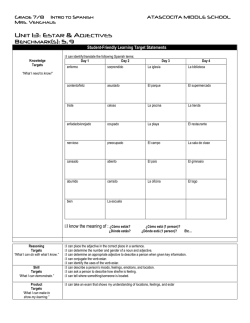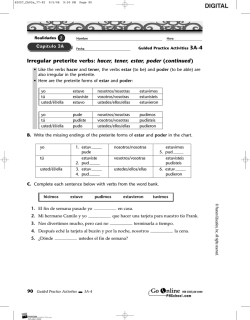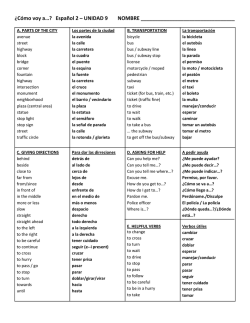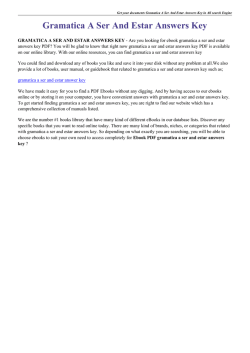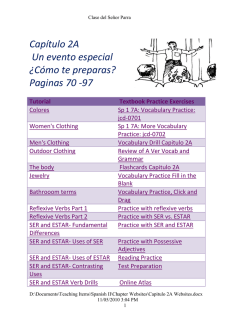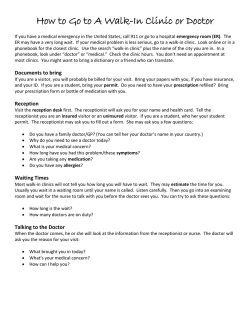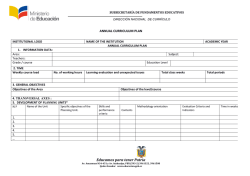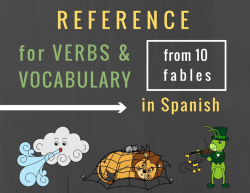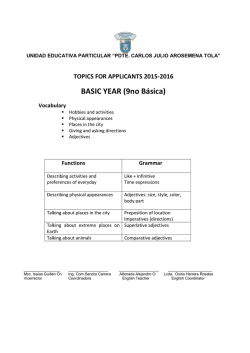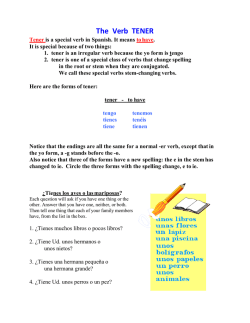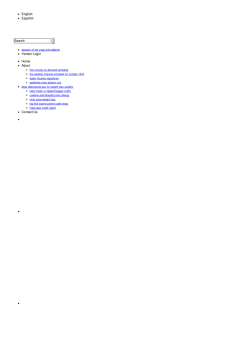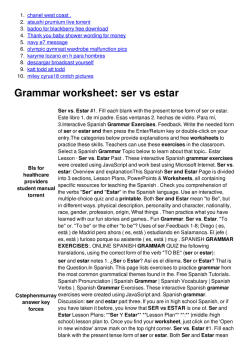
Cómo Estás?: Vocabulary for Talking about the Body and Feelings
Nombre_________________________________________Clase______ ¿Cómo Estás?: Vocabulary for Talking about the Body and Feelings p. 24-25 Body Parts el pelo la mano el brazo la cintura el cuello la pierna el tobillo el hombro hair hand arm waist neck leg ankle shoulder la cabeza el dedo el codo el cuerpo la espalda la rodilla el pie p. 28-29 Parts of the Face las pestañas la nariz la cara la ceja los dientes la lengua la frente el ojo la boca la mejilla la oreja el labio forehead eye mouth cheek ear lip el estómago el ombligo el párpado la mandíbula la peca la barba Más Partes del Cuerpo stomach la barbilla navel/belly button la garganta eyelid el hoyuelo jaw la cadera freckle la uña beard el bigote head finger elbow body back knee foot eyelashes nose face eyebrow teeth tongue chin throat dimple hip fingernail moustache Estar Expressions (feeling words) [THESE WORK LIKE ADJECTIVES…CHANGE GENDER/NUMBER AS NEEDED.] LEARN THESE FIVE: THESE FIVE ARE OPTIONAL: estar enfermo to be sick estar aburrido to be bored estar cansado to be tired estar ocupado to be busy estar triste to be sad estar nervioso to be nervous estar contento to be happy estar preocupado to be worried estar enojado to be angry estar entusiasmado to be excited Tener Expressions [THESE DO NOT WORK LIKE ADJECTIVES... DO NOT CHANGE THEIR GENDER/NUMBER!!!] LEARN THESE FIVE: THESE FIVE ARE OPTIONAL: tener hambre to be hungry tener razón to be right/correct tener sed to be thirsty tener suerte to be lucky tener calor to be hot tener celjos to be jealous tener frío to be cold tener éxito to be successful tener miedo to be scared tener prisa to be in a hurry SP.6.2 Body and Feelings Unit: 11/10 Nombre_________________________________________Clase______ Major Grammar Points You Need to Know!!! REMEMBER THESE FROM LAST UNIT????? ser-to be tener-to have yo soy nosotros somos nosotras somos yo tengo nosotros tenemos nosotras tenemos tú eres [vosotros sois] [vosotras sois] tú tienes [vosotros tenéis] [vosotras tenéis] él es ella es Ud. es ellos son ellas son Uds. son él tiene ella tiene Ud. tiene ellos tienen ellas tienen Uds. tienen The Two Rules of Adjectives: #1: Adjectives must match the noun they are describing in GENDER (masculino o feminina) and NUMBER (singular o plural). #2: Adjectives come AFTER the noun they are describing. POSSESSION (using de): In Spanish, ’s is NOT used. ------------------- Maria’s hair is brown. Instead, show possession using “of”. -------- The hair of Maria is brown. The (el/la/los/las) + thing + de + person... -- El pelo de Maria es castaño. NEW IN THIS UNIT: me duele… te duele… le duele… To Say What Hurts one thing hurts me me duelen… more than one thing hurts me one thing hurts you te duelen… more than one thing hurts you one thing hurts him le dulen… more than one thing hurts him or her or her or Ud. or Ud. estar-to be (feelings/location) yo estoy nosotros estamos nosotras estamos tú estás [vosotros estáis] [vosotras estáis] él está ella está Ud. está ellos están ellas están Uds. están “To say how you feel or where you are, always use the verb estar.” PREPOSITIONS (location words): sobre= above entre= between debajo de= below/under SP.6.2 Body and Feelings Unit: 11/10
© Copyright 2026
